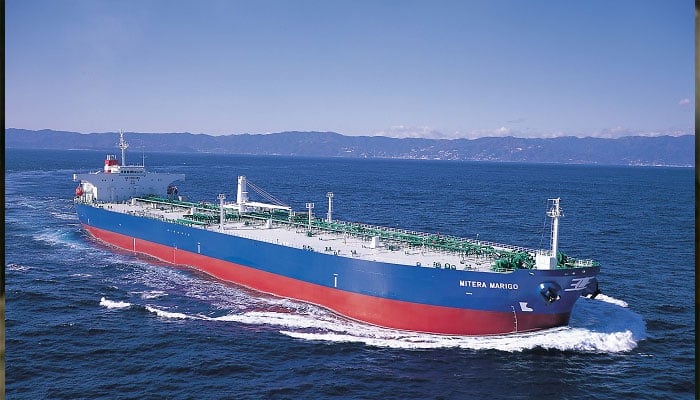PNSC plans to acquire Aframax tanker for expansion
KARACHI: Pakistan National Shipping Corporation (PNSC) has planned to acquire a used AFRAMAX tanker, with a deadweight of 10,5000 tons, to expand its customer base in the tanker segment.
PNSC has already invited bids from international suppliers in this regard, and the corporation expects the delivery by the third quarter of 2021-22.
Due to their favourable size, Aframax tankers can serve most ports in the world. These vessels serve regions that do not have very large ports or offshore oil terminals to accommodate very large crude carriers and ultra-large crude carriers. Aframax tankers are optimal for short- to medium-haul crude oil transportation. According to PNSC’s procurement plan, the corporation also intends to acquire two pilot boats and three LNG compatible tug boats.
Presently, PNSC has six tankers including Khairpur, Bolan, Quetta, Lahore, Karachi and Shalamar. The Corporation also has five bulk carriers including Chitral, Malakand, Hyderabad, Sibi and Multan. An official said during the first half of FY 2020-21, business momentum accelerated while overcoming the challenges posed by the second wave of Covid-19 pandemic, which had an adverse impact on global economic growth, including Pakistan.
“The State Bank of Pakistan (SBP) has taken a host of measures to dilute the impact of the pandemic, including cut in interest rates and introduction of refinance schemes. This act of SBP has created an opportunity for the Corporation to expand its managed fleet portfolio with the availability of cheaper financing in the form of Long Term Financing Facility (LTFF).”
According to PNSC’s last financial report, the tanker market has continued to face challenges from the disruption caused by Covid-19. Oil demand remains under pressure, where renewed ‘lockdowns’ amidst ‘second wave’ of Covid-19 have constrained progress towards economic recovery. “Further, Oil Production and Exporting Countries (OPEC)’s ongoing oil supply cuts have continued to severely restrict seaborne oil trade. With the recent announcement by OPEC+ that output cuts will be extended into next year, and with floating storage.”
The seaborne crude trade is estimated to have declined by 6.6 percent in 2020, with products trade falling by 9.0 percent, owing to sharply lower oil demand.
In second half of 2021, seaborne oil trade is expected to pick up following the severe disruption this year and initial projections suggest that crude trade may increase up to 5.9 percent, and the products trade by 6.4 percent. In general, the anticipated gradual improvement in global oil demand in second half of calendar year 2021 is expected to support increase in oil trade. However, with challenges remaining from high oil inventories and the unwinding of floating storage, it may not be until later in 2021 that significant market improvement materialises. In view of the aforesaid circumstances, PNSC is adopting a proactive approach, exercising caution and expanding its customer base in the tanker segment to mitigate any potential damage.
-
 Kate Hudson Explains Why Acting Isn't Discussed At Home
Kate Hudson Explains Why Acting Isn't Discussed At Home -
 Prince William, Kate Middleton Epstein Statement Was AI Generated, Says Expert
Prince William, Kate Middleton Epstein Statement Was AI Generated, Says Expert -
 Sarah Ferguson On Her Way To Hurt 'only Two People Who Care About Her'
Sarah Ferguson On Her Way To Hurt 'only Two People Who Care About Her' -
 World’s Top PC Maker Sounds Alarm Over Memory Chip Shortage
World’s Top PC Maker Sounds Alarm Over Memory Chip Shortage -
 King Charles Is ‘clearly Worried’ Andrew Has Tarnished Royal Image
King Charles Is ‘clearly Worried’ Andrew Has Tarnished Royal Image -
 Royal Family Loses 'loyal' Worker After King Charles Disliked His Work?
Royal Family Loses 'loyal' Worker After King Charles Disliked His Work? -
 James Van Der Beek's Quiet Sacrifice Before Death Comes To Light
James Van Der Beek's Quiet Sacrifice Before Death Comes To Light -
 Suspect Kills Six Across Florida Before Taking His Own Life
Suspect Kills Six Across Florida Before Taking His Own Life -
 AI Helps Researchers Identify 2,000-year-old Roman Board Game Stone
AI Helps Researchers Identify 2,000-year-old Roman Board Game Stone -
 Inside Kate Middleton, Prince William’s Nightmare Facing Andrew Mountbatten-Windsor
Inside Kate Middleton, Prince William’s Nightmare Facing Andrew Mountbatten-Windsor -
 Margaret Qualley Shares Heartfelt Confession About Husband Jack Antonoff: 'My Person'
Margaret Qualley Shares Heartfelt Confession About Husband Jack Antonoff: 'My Person' -
 Savannah Guthrie Shares Sweet Childhood Video With Missing Mom Nancy: Watch
Savannah Guthrie Shares Sweet Childhood Video With Missing Mom Nancy: Watch -
 Over $1.5 Million Raised To Support Van Der Beek's Family
Over $1.5 Million Raised To Support Van Der Beek's Family -
 Paul Anthony Kelly Opens Up On 'nervousness' Of Playing JFK Jr.
Paul Anthony Kelly Opens Up On 'nervousness' Of Playing JFK Jr. -
 Diana Once Used Salad Dressing As A Weapon Against Charles: Inside Their Fight From A Staffers Eyes
Diana Once Used Salad Dressing As A Weapon Against Charles: Inside Their Fight From A Staffers Eyes -
 Video Of Brad Pitt, Tom Cruise 'fighting' Over Epstein Shocks Hollywood Fans
Video Of Brad Pitt, Tom Cruise 'fighting' Over Epstein Shocks Hollywood Fans




